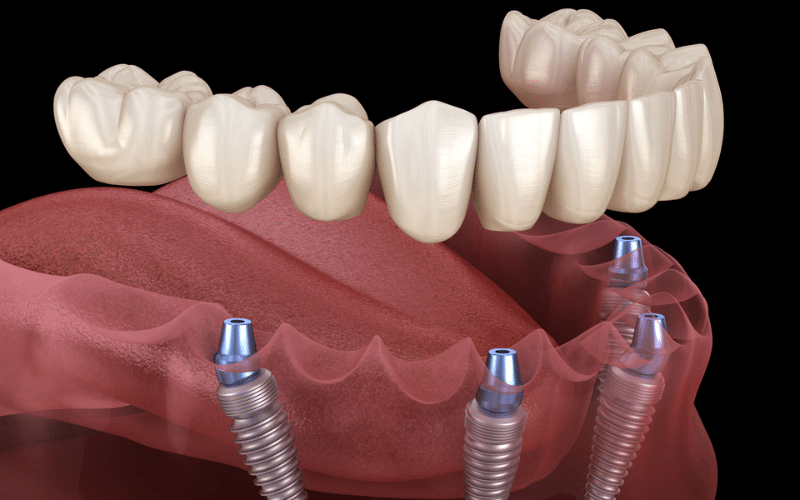Full arch dental implants are an innovative and highly effective solution for individuals who need to replace a full row of teeth, offering a long-lasting and natural-looking alternative to dentures. While they’re increasingly popular, not everyone is an ideal candidate for this treatment. This guide will help you understand what full arch implants are, the qualifications for candidacy, and what factors might affect your eligibility.
Full Arch Implants & Its Key Benefits
Full arch implants involve a fixed prosthesis secured by a few strategically placed implants along the jawbone. They provide patients with a stable, functional, and aesthetically pleasing replacement for an entire row of teeth, whether in the upper jaw, lower jaw, or both.
Benefits of Full Arch Implants
- Permanent Solution: Unlike removable dentures, these implants are securely anchored to the jaw, creating a permanent replacement.
- Natural Feel and Look: These implants look and function much like natural teeth.
- Enhanced Stability: With implants placed securely in the jawbone, there’s no risk of slipping or clicking.
- Improved Oral Health: Full arch implants stimulate the jawbone, helping to prevent bone loss, which can be common with traditional dentures.
Who Is a Good Candidate for Full Arch Implants?
While full arch implants offer an appealing solution, they may not suit everyone. Below are key factors that can determine whether you’re an ideal candidate:
1. Jawbone Health and Density
For full arch implants to work, there must be sufficient bone density in the jaw to support the implants. Implants are embedded into the jawbone, so they rely on the bone’s strength and stability for long-term success.
- Bone Density Check: Our dentist will assess your jawbone density through imaging (like X-rays or CT scans).
- Bone Grafting: If you have bone loss due to previous tooth loss, bone grafting might be necessary to build up the jawbone before implant placement.
2. Overall Health Condition
Your general health plays a crucial role in determining your eligibility for full arch implants. Certain medical conditions can affect your body’s ability to heal or increase the risk of complications.
- Chronic Conditions: Conditions such as diabetes, autoimmune disorders, or heart issues should be discussed with our dentist, as they can impact healing.
- Medication Considerations: Some medications may interfere with the healing process after surgery.
- Non-Smoker Status: Smoking can hinder healing, and most dentists recommend that candidates are non-smokers or willing to quit before surgery.
3. Gum Health
Healthy gums are essential for supporting dental implants. If you suffer from gum disease, you may need treatment before becoming a suitable candidate for full arch implants.
- Periodontal Evaluation: A dentist may perform a gum health assessment to check for inflammation or infection.
- Treatment First: Any existing gum disease should be treated before moving forward with implant surgery.
4. Commitment To Oral Hygiene
Full arch implants require excellent oral hygiene to prevent infection and ensure the longevity of the implants.
- Daily Care: Candidates must be committed to brushing, flossing, and routine check-ups.
- Professional Cleanings: Regular visits to the dentist for cleanings and inspections are essential for implant maintenance.
Steps To Determine Your Candidacy for Full Arch Implants Treatment

If you think full arch implants might be right for you, here’s what to expect during the evaluation process:
1. Initial Consultation
The first step involves a thorough consultation with our dentist or oral surgeon. They will review your medical history, examine your oral health, and discuss your goals for the implant treatment.
- Discussion of Goals: Explain what you hope to achieve with full arch implants, including aesthetic and functional aspects.
- Review of Medical History: Prepare to discuss your general health, any medications you take, and your past surgeries.
2. Dental Imaging
Imaging such as X-rays or CT scans is often used to assess jawbone density, bone quality, and gum health, which are critical for successful implant placement.
- X-rays and Scans: These images assist the dental team in creating a precise treatment plan by mapping out the optimal locations for implant placement.
- Bone Analysis: Dentists may perform a bone density assessment to ensure there is enough support for the implants.
3. Treatment Planning
Once we establish your candidacy, we will create a personalized treatment plan to suit your specific needs. This plan outlines the number of implants, location of placement, and steps for preparation or additional treatments, if necessary.
- Number of Implants: Full arch implants usually involve 4-6 implants per arch, depending on your jawbone quality.
- Additional Treatments: If you require bone grafting or gum disease treatment, your dental team will factor this into your treatment plan.
Full arch implants can be a life-changing solution for those needing extensive teeth replacement, offering enhanced comfort, durability, and aesthetics compared to traditional dentures.
However, they require careful evaluation to ensure you’re a suitable candidate. Factors like jawbone health, overall wellness, gum health, and commitment to oral hygiene play crucial roles in determining candidacy.
If you’re considering full arch implants, schedule a consultation with our dentist to assess your options and develop a personalized treatment plan. For those who qualify, full arch implants provide a remarkable pathway to a confident smile and restored dental function.


